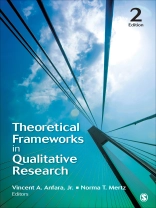The Second Edition of Theoretical Frameworks in Qualitative Research brings together some of today’s leading qualitative researchers to discuss the frameworks behind their published qualitative studies. They share how they found and chose a theoretical framework, from what discipline the framework was drawn, what the framework posits, and how it influenced their study. Both novice and experienced qualitative researchers are able to learn first-hand from various contributors as they reflect on the process and decisions involved in completing their study. The book also provides background for beginning researchers about the nature of theoretical frameworks and their importance in qualitative research; about differences in perspective about the role of theoretical frameworks; and about how to find and use a theoretical framework.
Содержание
PREFACE
1. Setting the Stage — Vincent A. Anfara, Jr. and Norma T. Mertz
2. Seeking Understanding of School Culture: Using Theory as a Framework for Observation and Analysys — Joyce L. Henstrand
3. Struggling With Theory: A Beginning Scholar′s Experience with Mazzoni′s Area Models — Frances C. Fowler
4. Black Feminist Thought and Examining the Experiences of Black Graduate Women in the Academy — Lori Patton Davis, Nadrea Njoku and Juhanna Rogers
5. Transformational Learning and HIV-Positive Young Adults — Sharan B. Merriam
6. Using Multiple Theoretical Frameworks to Study Organizational Change and Identity — Michael R. Mills and Pamela J. Bettis
7. Using ‘Othermothering’ to Study Administrative Worklife at Historically Black Colleges and Universities — Terrell L. Strayhorn
8. Mary Douglas′s Typology of Grid and Group — Edward L. Harris
9. Adapting Bourdieu′s Field Theory to Explain Decision-Making Process in Educational Policy — Carol A. Mutch
10. A Look Through the Kubler-Ross Theoretical Lens — Kerri S. Kearney and Adrienne E. Hyle
11. Examining the Intersection of Race, Gender and Environment Using Bronfenbrenner′s Bioecological Systems Theory of Human Development — R. Darrell Peterson
12. Lagniappe: Theoretical Frameworks in Brief — Various
13. Closing the Loop — Norma T. Mertz and Vincent A. Anfara, Jr.
ABOUT THE EDITORS
ABOUT THE CONTRIBUTORS
Об авторе
Norma T. Mertz is Professor of Educational Administration and Policy Studies at The University of Tennessee. She received her Ed.D. in Curriculum and Teaching from Teachers College, Columbia University, with a collateral in anthropology and education. Before becoming a faculty member in educational administration at The University of Tennessee she taught language arts and social studies in every grade from 7th through 12th; prepared teachers to work in urban, inner city-schools in Michigan and New York City as an assistant professor at Eastern Michigan University and Hunter and Brooklyn Colleges; and was an assistant director of the Race Desegregation Assistance Center and Director of the Sex Equity Assistance Center before joining the faculty of educational administration. Her research has been published in Educational Administration Quarterly, Urban Education, Journal of School Leadership, Planning and Changing, and Communications of the ACM, and represents both qualitative and quantitative research designs.












